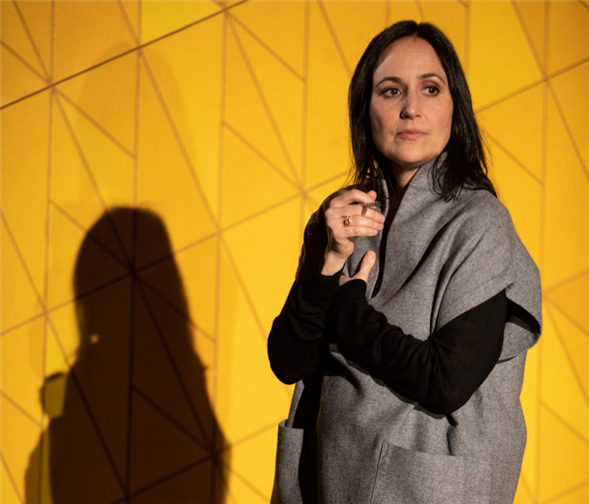Translate Page

Heather Raffo on writing and starring in the Iraqi immigrant tale Noura at Playwrights Horizons
---
Heather Raffo says she grew up as a "sheltered Michigan girl -- a really nice, open, conservative" and blonde American who spoke English with a flat Midwestern accent. Then, at age 20, the Gulf War changed her identity. She became an Iraqi-American practically overnight.
Now, almost three decades later, Raffo, in long (dyed) black hair, is portraying the title character in her one-act play Noura at Playwrights Horizons, about an Iraqi family celebrating their first Christmas after becoming American citizens. It doesn't go as planned. They too are forced to adjust to a new identity.
Raffo's father was raised in the Iraqi city of Mosul but immigrated to the United States, giving up his Iraqi passport for an American one. He married Raffo's mom, a Michigan native, and wholeheartedly embraced his adopted homeland. "He wouldn't even teach my brother and me Arabic," Raffo says. "He thought it would cripple us."
Then President George H. W. Bush launched the Gulf War. Raffo remembers watching it unfold on television alongside her classmates at University of Michigan - Ann Arbor. Some of her fellow students cheered as the bombs were dropped while she looked on, horrified. "The entire country of Iraq was being demonized as if they were all the mass murderers that Saddam was," Raffo says. "I had a hundred family members in Baghdad that could have been eviscerated."
Not long after graduating, Raffo decided to take a five-week trip to Iraq to visit relatives. "It was like an orphan finding her birth parents," she recalls. While there, she attended a retrospective for Layla Al-Attar, an artist and museum director who had recently been killed by a U.S. missile. Al-Attar became the inspiration for the first character in 9 Parts of Desire, Raffo's breakthrough solo play in which she portrayed nine different Iraqi women. The show opened at Off-Broadway's Manhattan Ensemble Theater in 2004 to wide acclaim and ran for eight months.
{Image1}
From an early age, Raffo knew she wanted to be "an artist or an intellectual in the arts." However, during both her undergraduate and graduate studies in theatre, she was never assigned an "English-language play with a Middle Eastern character." 9 Parts of Desire was part of a new movement in Middle Eastern American theatre post 9/11, and her newfound recognition led to a grant to try to get more Arab-American New Yorkers to go to the theatre. She targeted the toughest members of the community: new immigrants and refugees. Next, she organized a series of writing workshops for women, mostly students. For one assignment, she had them read Henrik Ibsen's A Doll's House, asked them to pick an aspect of the play that resonated for them, and then write about their own personal experiences. Most zeroed in on having a secret or fleeing their homes.
"They had harrowing stories of leaving," says Raffo, who notes that of the 100 relatives she had in Iraq in the '90s, only two remain, with the rest scattered around the world. "Many of these women had escaped. All of them -- myself included -- are trying to balance love for a communal identity with the needs of an individual identity. A lot of the women have to keep a lot of secrets from their families and their community."
Noura is an outgrowth of Raffo's own response to A Doll's House. "This Noura is post-Nora," she says. "She's already walked out" -- literally from her hometown of Mosul, after it was overrun by ISIS, and metaphorically from her community. Noura is also burdened by secrets which unravel with the visit of an orphan who also grew up in Mosul.
In addition, Noura examines the challenges of modern marriage and motherhood. Raffo says the play reflects both her own "beautiful family" in Brooklyn (she and her husband have two children ages 8 and 10) as well as "the pressure of mothering in a community and lifestyle that doesn't support mothering."
But don't mistake Noura for a reinvention of A Doll's House as it doesn't follow that story. "I don't like the Ibsen play," Raffo admits. "It's done so often, but it doesn't speak to what's happening right now." So why use it for inspiration? "Oftentimes we do things because we’re upset about them -- that's a creative impulse."
To read about a student's experience at Noura, check out this post on TDF's sister site SEEN.
---
TDF MEMBERS: At press time, discount tickets were available for Noura. Go here to browse our current offers.
Jonathan Mandell is a drama critic and journalist based in New York. Visit his blog at NewYorkTheater.me or follow him on Twitter at @NewYorkTheater. Follow TDF at @TDFNYC.
Top image: Heather Raffo in Noura. Photos by Joan Marcus.